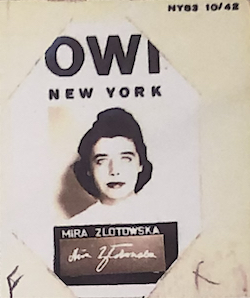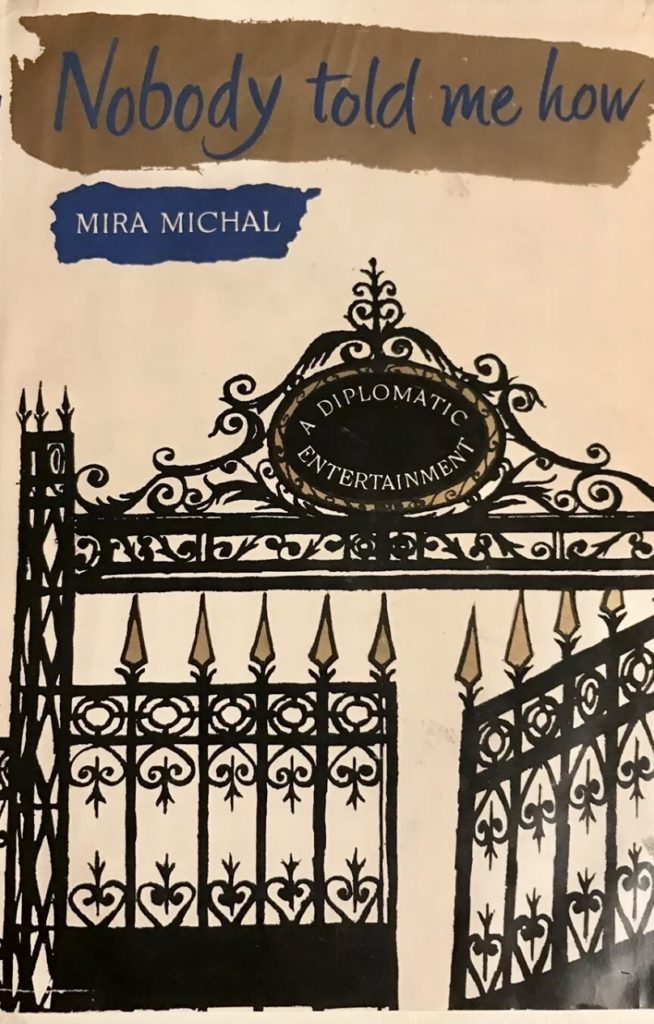Mira Złotowska – Michałowska — from VOA to a communist ambassador’s wife
By Ted Lipien for Cold War Radio Museum
Soviet influence at Voice of America during World War II — documents and analysis

Soviet influence at WWII Voice of America
From VOA to communist regime journalist
Choices of VOA’s pro-Soviet journalist
VOA journalist marries Communists
A pro-Soviet propagandist at OWI and VOA
VOA communist partner Stefan Arski
Pro-Soviet collaborators at OWI and VOA
A VOA friend of Stalin Peace Prize winner
Among Soviet sympathizers at VOA
Critics of her communist influence at VOA
Was she VOA’s communist ‘Mata Hari’?
Mira Złotowska, later known as Mira Michałowska who published books and articles in English as Mira Michal and used several other pen names, was one of many radically left-wing journalists who during World War II worked in New York on Voice of America (VOA) U.S. government anti-Nazi radio broadcasts but also helping to spread Soviet propaganda and censoring news about Stalin’s atrocities. While not the most important among pro-Soviet propagandists at the Voice of America during the war, Michałowska later went back to Poland, married a high-level communist diplomat and for many years supported the regime in Warsaw with soft propaganda in the West while also helping to expose Polish readers to American culture through her magazine articles and translations of American authors. One of the American writers she translated was her former VOA colleague and friend, the 1953 Stalin Peace Prize winner Howard Fast who in 1943 played an important role as VOA’s chief news writer. Despite today’s Russian attempts to undermine journalism with disinformation, the Voice of America has never officially acknowledged its mistakes in allowing pro-Soviet propagandists to take control of its programs for several years during World War II. Eventually, under pressure from congressional and other critics, the Voice of America was reformed in the early 1950s and made a contribution to the fall of communism in East-Central Europe.
Life of a diplomatic wife

After leaving her job as a writer and editor of Voice of America Polish-language radio scripts and a producer of pro-Soviet propaganda pamphlets at the Office of War Information in New York, Mira Michałowska continued her writing career as an author of books and translator of American literature. While living in the United States as a diplomatic wife, Michałowska, under the pen name Mira Michal, published one of her books in English. Titled Nobody Told Me How: A Diplomatic Entertainment, the book’s description said that “Mira Michal had never set foot inside an embassy until she married the Polish ambassador to the Court of St. James’s…this charming and cheerfully irreverent young woman began learning by trial and error.”
To be clear, Mira Michałowska was the wife of the ambassador of the repressive communist regime, imposed by Russia and never freely elected by the Polish people, but that is not what she wanted to emphasize to Americans in her book or in her articles which she managed to get published in The Atlantic, Harper’s Magazine, Vogue, New Yorker and The Virginia Quarterly Review. Further in her book’s promotional introduction, one reads: “Miss Michal also describes the diplomatic whirl in the affluent society in New York, how U.N. wives get along with one another, how she and her husband made new acquaintances, and how, somehow, amid the strangeness and confusion of the city, they found, of all things, a Polish cook.
Subtle and sophisticated in her propaganda articles for American consumption, she apparently was not ashamed of writing and talking about organizing diplomatic dinners in Western capitals and even offering food recipes while most women in communist-ruled Poland had to stand in lines for many hours to purchase the most basic food items. Polish workers rebelled and some died in the 1956 demonstrations against the lack of freedom, food shortages and high food prices. They rebelled again, and some died again in similar workers’ protests in Poland in 1970. There were more workers’ protests in 1976 and 1980 leading to the collapse of communism in Poland in 1989.
During the Cold War, most Poles also could not afford to travel to the West, assuming they could get tourist passports valid for countries behind the Iron Curtain. Strong opponents of the regime among Polish intellectuals were often banned from travel abroad and could not publish in Poland, but the communist elite lived well, published books, made money and traveled freely.
Mira Michałowska and her pro-Soviet colleagues at the Voice of America, Stefan Arski and Adolf Hoffmeister, could have stayed in the United States after the war and have comfortable middle-class or even upper middle-class lives. By choosing to serve pro-Soviet regimes, they immediately joined the communist elite in their countries, becoming the Red aristocracy, while the rest of the population led a miserable existence for several decades under political repression and state-socialist economy with chronic shortages of food and consumer goods.
Ted Lipien was Voice of America acting associate director in charge of central news programs before his retirement in 2006. In the 1970s, he worked as a broadcaster in the VOA Polish Service and was the service chief and foreign correspondent in the 1980s during Solidarity’s struggle for democracy in Poland.


